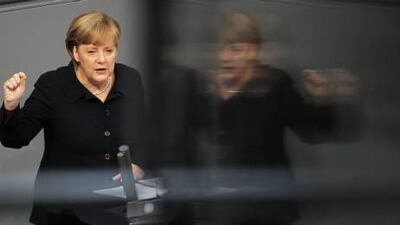BERLIN // The fate of Europe lies in her hands, but Angela Merkel, the German chancellor, has refused to wield her power to save the single currency, and she is becoming increasingly isolated in Europe as a result.
Caution is her trademark, and commentators at home have tired of criticising her lack of fist-on-the-table leadership over the years.
There is no point - it is just not her style.
So it has come as a surprise to Germans that Mrs Merkel, who makes her husband's breakfast in the morning and likes to cook potato soup in her free time, is being accused abroad of seeking to stamp a Teutonic identity on Europe and even, according to shrill commentaries in Britain, of trying to create a "Fourth Reich".
Mrs Merkel dismissed the criticism in a speech to parliament yesterday, but reiterated her demand that Europe must tackle the debt crisis by creating a "fiscal union" with binding rules to enforce German-style budget discipline.
"Our guidelines are clear but it is important to me to say that they have nothing to do with fears and concerns one can read or hear at the moment that Germany wants to dominate Europe. That is absurd," she said.
"We are advocating a stability and growth culture in the European spirit of Konrad Adenauer and Helmut Kohl," she added, referring to two former chancellors who promoted European integration.
She also underlined Germany's commitment to Europe, and its gratitude to its EU partners for backing German unification in 1990, saying: "German and European unity were and remain two sides of the same coin and we will never forget it."
Mrs Merkel, 57, can't win. Germany's economic power is triggering resentment and jealousy across Europe, especially in Paris and London, and its failure so far to lead Europe out of the crisis is causing equal anger.
For the first time since the Second World War, Germany, as Europe's biggest and most stable economy, is being called on to flex its muscles and show true leadership.
Radoslaw Sikorski, the Polish foreign minister, referred to his country's troubled history with Germany when he said on Monday: "I will probably be the first Polish foreign minister in history to say so, but here it is: I fear German power less than I am beginning to fear German inactivity."
The nation, and especially Mrs Merkel, is uncomfortable with this new responsibility, and is already getting a taste of how lonely it can be at the top.
Die Welt, a conservative German newspaper, commented on Tuesday that Germany was as isolated now as the US was during the 2003 invasion of Iraq.
"Germany is being confronted with unfulfillable demands," the newspaper wrote. "On the one hand our fellow Europeans expect Germany to show more leadership in solving the crisis. On the other hand our new power is triggering rejection and resentment."
Mrs Merkel's crime in the eyes of the rest of Europe is her refusal to agree to radical measures that would raise the cost to German taxpayers, and could fuel inflation.
Yesterday, she again rejected demands for euro bonds, which would pool European government borrowing and reduce bond interest rates that are now crippling high-debt nations like Spain and Italy.
She is also opposed to large-scale bond purchases by the European Central Bank to bail out troubled countries. Europe, she argues, must avoid measures that would remove the incentive on countries to get their budgets in order.
But Mrs Merkel's solution is a long-term one, and time is running out for Europe.
Politicians, economists and financial markets have said the currency will be doomed unless EU leaders come up with a solution at their summit next week.
Level-headed Mrs Merkel, however, appears unperturbed by the storm raging around her.
Even France, Germany's closest ally in Europe, is exasperated with the unflappable pastor's daughter. Le Monde, the nation's leading newspaper, said "the fear of a German Europe is growing among top French politicians".
The former French president of the European Commission, Jacques Delors, described Mrs Merkel's hesitant leadership at the start of the crisis as "disastrous".
Critics have said she is putting at risk the legacy of former leaders who lived through the war and tried to unite the continent for the sake of peace.
While Mrs Merkel, who was born after the war and grew up in communist East Germany, may not be as passionately pro-European as her predecessors, her detractors are ignoring the fact that she is not as powerful as she might seem.
Her government would collapse if she signed German taxpayers up to major new risks. She is also hamstrung by the constitutional court, which has given the parliament a greater say in future bailouts.
Mrs Merkel's main mistake, analysts say, has been her failure to forcefully convey to Germans that they have benefited far more from the euro than any other nation, because the currency has created a vast export market free of exchange-rate risks.
Accordingly, Germany has most to lose if the euro zone breaks apart. Despite the prophecies of doom, that simple fact should spur Germany to save the currency in the end, many commentators here are saying.

